
A platform that encourages healthy conversation, spiritual support, growth and fellowship

NOLACatholic Parenting Podcast
A natural progression of our weekly column in the Clarion Herald and blog

The best in Catholic news and inspiration - wherever you are!
Students’ social-emotional health the focus of gathering
-
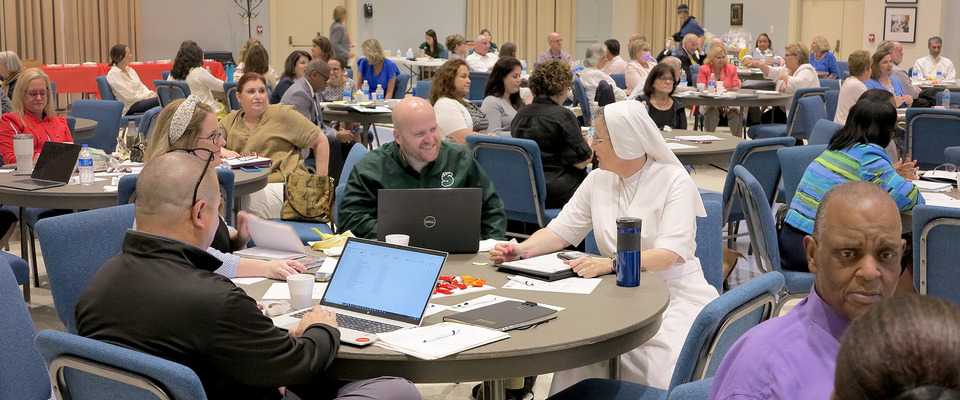 By BETH DONZE
By BETH DONZE
Clarion HeraldBecause character traits such as empathy, self-worth, personal responsibility and good decision-making already align well with virtues promoted by the church, Catholic schools have a head-start when it comes to making students’ social and emotional health as much of a priority as academics, a panel of mental-health professionals told 75 Catholic school leaders gathered at Notre Dame Seminary for their July 28 convocation held in anticipation of the upcoming school year.
“As Catholics we are truly called to live a life of virtue,” said Whitney Stovall, who recently completed 10 years as a school counselor in Tennessee and worked with Friendzy, a Scripture-based character development program serving more than 100,000 students in Catholic schools across the country.
“(Educators in Catholic schools) are already teaching these values in a powerful way,” Stovall said. “God is calling us to step up and do the work that we’re already doing!”
Emotional intelligence hubs
Friendzy co-founder Joy Roberts said schools that are actively engaged in their students’ social and emotional well-being are those in which every single student feels “seen, known, heard, valued and loved.” Emotionally intelligent children, Roberts added, are those who possess the skills to manage the highs and lows of life and who can handle conflict and tension in constructive, rather than destructive, ways. In short, they are problem-solvers who practice empathy, compassion and kindness – character traits that will serve them not only in the classroom, but long after their final school bell has sounded, she said.
“It’s that ability to connect relationally with others,” Roberts explained. “What it boils down to is God’s design for healthy relationships – healthy relationships with him, healthy relationships with people.”
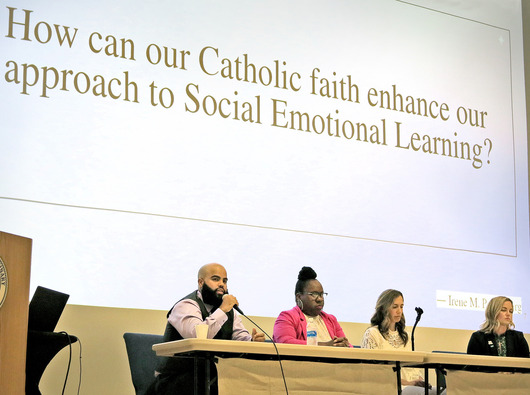 COVID-19 fallout
COVID-19 falloutYet, no matter how Christ-centered a Catholic school might be, every student needs to learn and practice skills related to managing their emotional and social health, especially in the wake of some alarming trends in children’s health that have surfaced since the onset of the pandemic, and additional challenges such as Hurricane Ida.
Dr. Domonique Lemieux, a therapist with DePaul Community Health Centers and a former school-based therapist, said rates of clinical anxiety and depression among children have increased sharply over the last two years. But of most concern, she said, is the recent uptick in suicidal ideation, suicide attempts and suicide completion in the pediatric population. For the first time in recorded history, “African American youth are far outpacing their other cultural counterparts” in suicide, Lemieux said.
Stovall said the isolation and grief wrought by COVID-19 has had lingering effects on the mental health of everyone, no matter their age or occupation. So, if educators are wondering, “Is it just my school,” the answer is “no,” she said.
“Everyone is dealing with the same (concerns),” Stovall said, who noticed that her outside referrals for anxiety, attempted suicide and self-harm in her last two years as a school counselor “far exceeded” those made in the previous eight years. Stovall also saw more pronounced separation anxiety in her younger students at morning carpool and detachment in middle schoolers who “didn’t get to flex their social muscle” during lockdown and virtual instruction.
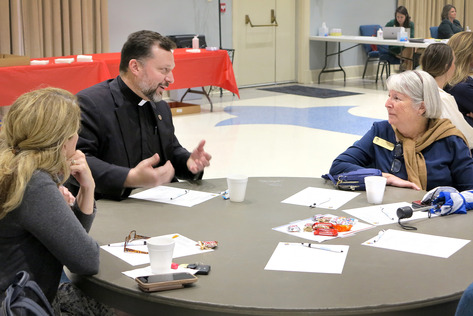 “A lot of re-teaching has had to take place,” Stovall said. “The good news is, as Catholic educators, we have always wanted to meet the needs of, and teach to and support, the whole child.”
“A lot of re-teaching has had to take place,” Stovall said. “The good news is, as Catholic educators, we have always wanted to meet the needs of, and teach to and support, the whole child.”Describing the pandemic as “a global crisis of disconnection and trauma” for students, teachers, staff and parents alike, Roberts said increased incidence of children acting out in the classroom, disrespecting their teachers and not being able to focus on tasks could very well be the lingering effects of that protracted trauma and not be written off as simple “misbehavior.”
“We have to tool-up,” Roberts told the educators. “We don’t know what the long-term ramifications are.”
Faith-based edgeLemieux said another way Catholic schools are wonderfully designed to teach social-emotional skills is their ability to connect the wide range of human emotions to the way God designed his children.
“God didn’t create us to be robots! Sometimes we forget that all of our emotions are OK,” Lemieux said, cautioning the educators that they might unconsciously be promoting the idea that their students must be “happy all the time.”
“Being angry is OK,” Lemieux said, pointing to Jesus’ righteous anger with the money changers in the temple and his weeping at the death of Lazarus. “Jesus himself behaved according to his emotions,” but he also taught us that there are appropriate ways to express those feelings.”
Roberts noted that while whole books of the Bible are devoted to human struggles such as grief, disappointment and self-doubt, the faith that anchors Catholic schools reminds us that we need never lapse into despair.
“Catholic schools are uniquely positioned to provide care, love and hope – hope that we’re not stuck (in a bad situation); hope that something better can and will come,” Roberts said.
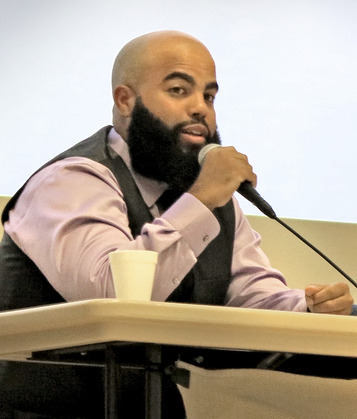 Not a pesky ‘add-on’
Not a pesky ‘add-on’Zachary Baquet, who helps teachers implement social and emotional learning strategies at 60 Catholic and independent schools through an effort called Project Wayfinder, said a concern he hears from teachers about launching a virtues-building program is “I just can’t do one more thing.”
“Social-emotional learning is (actually) the gateway to sound pedagogy – it’s not an ‘add-on’ at all,” Baquet said, citing a few benefits of building a school culture that puts students’ emotional health on the front-burner.
“Kids need empathy; kids need to be able to take turns; they need to be able to trust their peers,” he said. “(Educational exchanges) don’t thrive when people don’t feel like they belong.”
Baquet, a graduate of St. Augustine High School and former high school vice principal, said that emotional and social skills learned in the classroom and on the playground stay with a person for a lifetime, whereas some academic courses are forgotten or become obsolete by the time a student enters the workforce.
“What (skills) are going to stand the test of time?” Baquet asked the educators. “Adaptability; resilience; purpose; agency; communication; empathy – your students are going to need those skills, no matter where they are working.”Omnipresent social media are another reason to initiate virtues-teaching in K-12 classrooms, Baquet said.
“When they’re walking around your campus, in their pockets they’re walking around online (thinking of their cell phones),” Baquet said. “We have to sit with them and be able to support those needs, because they are unique to this generation.”
Baquet warned that youth “seeking purpose and belonging” can become so obsessed with a celebrity or social media influencer, they will attempt to “change everything about themselves” overnight. The adults often are unaware of the narrative playing out on those computers and phones.
To counter these interactions, Baquet said teachers could facilitate conversations with their students on topics such as, “What does it look like to ‘belong’ on TikTok?”
“Wouldn’t it be centering if we could focus on God in those moments?” Baquet asked the school leaders. “We can say, it’s hard to be LeBron James, but Jesus is inside of you! The Holy Spirit is inside of you. You have gifts. You don’t have to go on TikTok to find a role model. That’s such a powerful thing that (Catholic schools) have that other schools (don’t).”
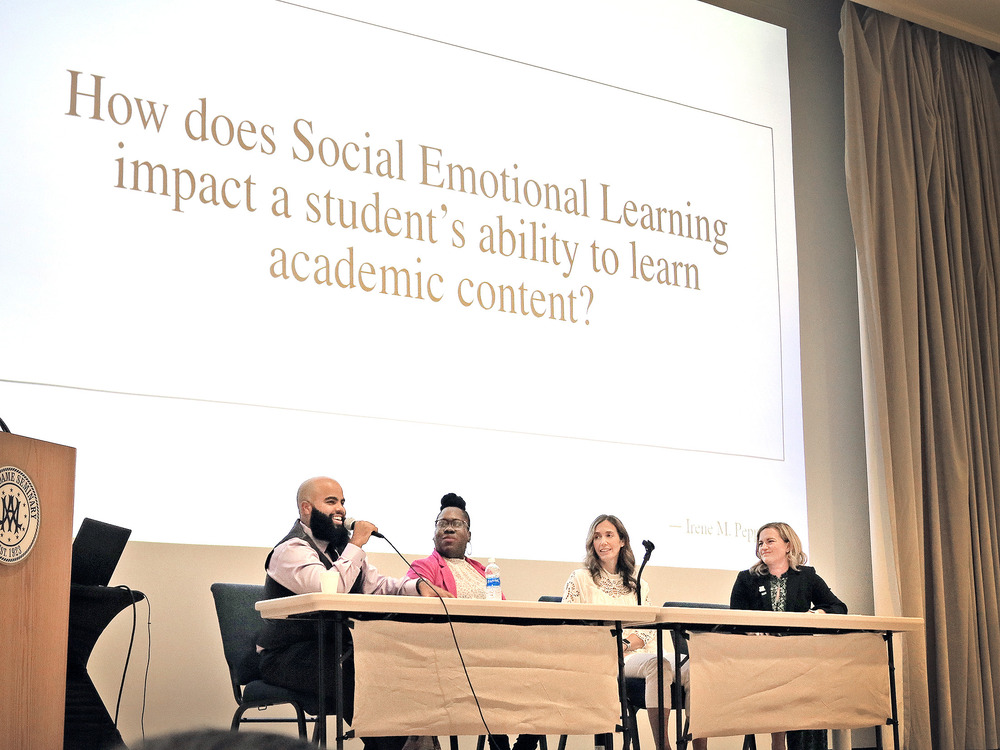
Better learning environmentThe panelists told the assembled educators that far from being a time-sapper, teaching social-emotional skills is a major time-saver when it comes to students’ mastery of academics. Roberts said “deep learning” most likely occurs when there are strong relational connections between a student and his teacher and from peer to peer.
“Students learn way better from teachers that they like – teachers who they know love them, care about them, see them, take time to know them and engage with them,” Roberts said, also advising teachers to build “intentional time” each day for their students “to learn about and from each other.”
Baquet also pointed to studies that show that students who have a strong sense of belonging and purpose also do better academically, saving teachers time in the long term by not having to reteach content. Questions that cultivate a sense of belonging in even the hardest-to-reach students could include a teacher asking them “How are we feeling about Chapter 5?” or “Do you want to break into groups to go over the material?” or “Would you like to take a practice test?” – which tells students that they have room to safely fail and improve before the “real” test.
“There’s research that indicates that failure is really important to the learning process,” Baquet said. “But if our kids are scared to fail because they feel really bad afterwards or if they’re scared to fail because they’re going to feel shame or they’re not even gonna try, what’s the point of that physics lesson? None of the stuff that we say is so important is getting done if your kids aren’t authentically trying – pushing themselves out of their comfort zones, stretching. It takes belonging to do that. It takes a kid feeling like they’re included in the space. It takes a kid feeling like they can be themselves and be wrong.”
Baquet warned that social-emotional learning can’t be something that exists “only in theology class.” He suggested that teachers in every discipline could do a weekly “pulse check” to gather their students’ thoughts on what abstract concepts such as “self-compassion,” “purpose” and “adaptability” mean from their young perspectives.
“They’re the experts – they’re the ones on TikTok; they’re the ones on Instagram; they’re the ones who have experienced cyberbullying,” Baquet said. “They know what it feels like, and we don’t. So, it’s really important for us to set them up to have those conversations and build connections with each other. Find a tool that will allow you to hear your students’ stories!”




